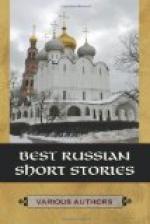Yet the clearness and the joy of the spring day were not in the village. They were somewhere outside the village, where there were no people—in the fields, the woods and the mountains. In the village the air was stifling, heavy and terrible as in a nightmare.
Gabriel Andersen stood in the road near a crowd of dark, sad, absent-minded people and craned his neck to see the preparations for the flogging of seven peasants.
They stood in the thawing snow, and Gabriel Andersen could not persuade himself that they were people whom he had long known and understood. By that which was about to happen to them, the shameful, terrible, ineradicable thing that was to happen to them, they were separated from all the rest of the world, and so were unable to feel what he, Gabriel Andersen, felt, just as he was unable to feel what they felt. Round them were the soldiers, confidently and beautifully mounted on high upon their large steeds, who tossed their wise heads and turned their dappled wooden faces slowly from side to side, looking contemptuously at him, Gabriel Andersen, who was soon to behold this horror, this disgrace, and would do nothing, would not dare to do anything. So it seemed to Gabriel Andersen; and a sense of cold, intolerable shame gripped him as between two clamps of ice through which he could see everything without being able to move, cry out or utter a groan.
They took the first peasant. Gabriel Andersen saw his strange, imploring, hopeless look. His lips moved, but no sound was heard, and his eyes wandered. There was a bright gleam in them as in the eyes of a madman. His mind, it was evident, was no longer able to comprehend what was happening.
And so terrible was that face, at once full of reason and of madness, that Andersen felt relieved when they put him face downward on the snow and, instead of the fiery eyes, he saw his bare back glistening—a senseless, shameful, horrible sight.
The large, red-faced soldier in a red cap pushed toward him, looked down at his body with seeming delight, and then cried in a clear voice:
“Well, let her go, with God’s blessing!”
Andersen seemed not to see the soldiers, the sky, the horses or the crowd. He did not feel the cold, the terror or the shame. He did not hear the swish of the knout in the air or the savage howl of pain and despair. He only saw the bare back of a man’s body swelling up and covered over evenly with white and purple stripes. Gradually the bare back lost the semblance of human flesh. The blood oozed and squirted, forming patches, drops and rivulets, which ran down on the white, thawing snow.
Terror gripped the soul of Gabriel Andersen as he thought of the moment when the man would rise and face all the people who had seen his body bared out in the open and reduced to a bloody pulp. He closed his eyes. When he opened them, he saw four soldiers in uniform and red hats forcing another man down on the snow, his back bared just as shamefully, terribly and absurdly—a ludicrously tragic sight.




